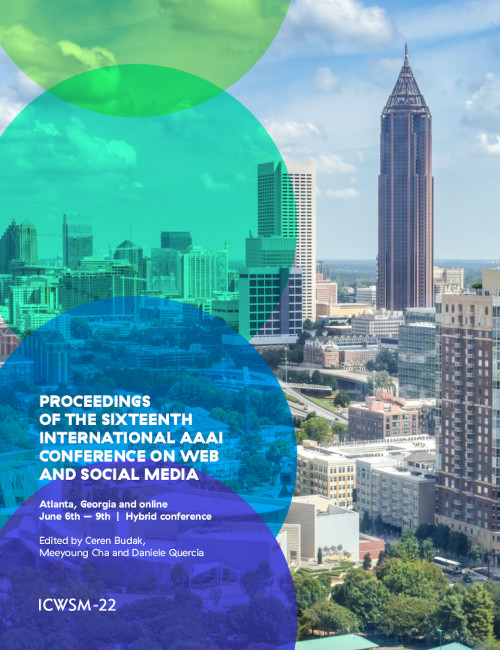Characterizing Online Engagement with Disinformation and Conspiracies in the 2020 U.S. Presidential Election
DOI:
https://doi.org/10.1609/icwsm.v16i1.19345Keywords:
Credibility of online content, Social network analysis; communities identification; expertise and authority discovery, Organizational and group behavior mediated by social media; interpersonal communication mediated by social media, Qualitative and quantitative studies of social mediaAbstract
Identifying and characterizing disinformation in political discourse on social media is critical to ensure the integrity of elections and democratic processes around the world. Persistent manipulation of social media has resulted in increased concerns regarding the 2020 U.S. Presidential Election, due to its potential to influence individual opinions and social dynamics. In this work, we focus on the identification of distorted facts, in the form of unreliable and conspiratorial narratives in election-related tweets, to characterize discourse manipulation prior to the election. We apply a detection model to separate factual from unreliable (or conspiratorial) claims analyzing a dataset of 242 million election-related tweets. The identified claims are used to investigate targeted topics of disinformation, and conspiracy groups, most notably the far-right QAnon conspiracy group. Further, we characterize account engagements with unreliable and conspiracy tweets, and with the QAnon conspiracy group, by political leaning and tweet types. Finally, using a regression discontinuity design, we investigate whether Twitter's actions to curb QAnon activity on the platform were effective, and how QAnon accounts adapt to Twitter's restrictions.Downloads
Published
2022-05-31
How to Cite
Sharma, K., Ferrara, E., & Liu, Y. (2022). Characterizing Online Engagement with Disinformation and Conspiracies in the 2020 U.S. Presidential Election. Proceedings of the International AAAI Conference on Web and Social Media, 16(1), 908-919. https://doi.org/10.1609/icwsm.v16i1.19345
Issue
Section
Full Papers

